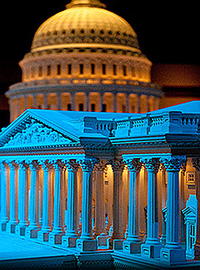| GOP To Use Congressional Review Act To Challenge Obama |
 |
|
By Ashton Ellis
Wednesday, January 21 2015 |
With complete control of Congress, Republicans can now force President Barack Obama and his liberal allies to embrace the regulations they like, but would rather not talk about. The method of choice is the seldom-used Congressional Review Act (CRA). Passed in 1996, the CRA gives Congress the opportunity to disapprove of federal agency rules. It authorizes a fast-track process to quickly put a halt on regulations before they go into effect. The CRA has been used successfully only one time – in 2001 when a leftover Clinton administration ergonomics rule was disapproved by a Republican Congress and signed into oblivion by the incoming-president, George W. Bush. That unique circumstance makes eliminating a rule via the CRA quite difficult. “It hasn’t been possible to use this in a divided Congress,” Rep. Bob Goodlatte (R-VA) told The Hill. “But now that it is, we certainly are interested in reviewing regulations to make sure they meet with congressional intent.” Under the CRA, both houses of Congress must agree to stop an agency’s final rule from going into effect. If they do, then the joint resolution of disapproval goes to the president for signature. If signed, the rule dies. Of course, if the president vetoes the measure, then the agency rule is implemented, unless Congress can override. Currently, that would require all Republicans plus 15 Democrats in the Senate and 45 Democrats in the House of Representatives. Getting that many Democrats to buck President Barack Obama is highly unlikely. Still, the CRA gives Republicans an opportunity. When former Senate Majority Leader Harry Reid (D-NV) controlled the upper chamber, GOP-backed legislation from the House was dead-on-arrival. Now, a simple Republican majority in both houses can start using the CRA to highlight serious policy differences between the parties. The move also might drive a wedge between the president and members of his party. Without a friendly Congress, the Obama administration has turned to agency rulemaking as the means for enacting landmark policy changes that – constitutionally speaking – should go through the legislature. So long as Congress was divided along partisan lines, Democrats could complain about specific examples of executive overreach – such as the EPA’s “Clean Power Plan” – without having to worry about actually voting on the matter. Now things are different. Even if President Obama vetoes every CRA disapproval and Republicans can’t muster the votes to override, that’s potentially two votes every Democrat would have to cast in favor of executive lawmaking – one approving of the agency rule, another approving of the veto. If Republicans are selective in the regulations they target – for example, rules that implement the War on Coal – they can make it very difficult for Democrats in places like West Virginia and Pennsylvania to vote for their president instead of their constituents. More broadly, using the CRA to draw clear contrasts between the parties’ governing philosophies enables Republicans to cast Democrats as the defenders of central planning. No politician likes the idea of telling her constituents that elites in Washington, D.C. know better than they do how much energy should cost or which health care plan to buy. Better, such politicians think, to leave the heavy-lifting to the unnamed, well-credentialed bureaucrats who are vilified by the same elected officials who quietly applaud their government-enhancing edicts. It’s past time for Democrats from Obama on down to own their regulations outright. If they can’t be bothered to submit their policies to the legislative process, then the least they can do is vote on the record to approve of the outcomes their friends in the bureaucracy churn out. Our system of political accountability demands that elected representatives be judged on the soundness of their decisions. If Democrats would rather outsource their legislative duties to federal agencies, voters ought to know. |
Related Articles : |
























